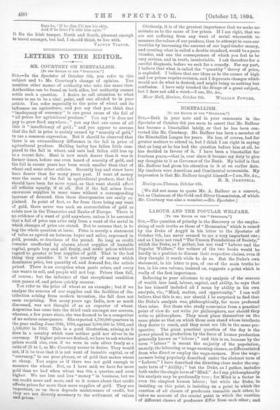LETTERS TO THE EDITOR.
MR. COURTNEY ON BIMETALLISM.
[To THE EDITOR OF THE ' SrEcrizon..1
SIR,—In the Spectator of October 6th, you refer to this subject and t) Mr. Courtney's change of opinion. You mention other names of authority who take the same view. Authorities can be found on both sides, but authority cannot settle such a question. I desire to call attention to what seems to me to be a vital point, and one alluded to in your article. You refer especially to the price of wheat and its influence on agriculture, and you say that you think that " inadequacy of currency " is one great cause of the fall of "all prices for agricultural produce." You say "it does not pay to grow food anywhere ; " you say that one cause of all this is "insufficiency of gold ; " and you appear to assume that the fall in price is mainly caused by " scarcity of gold," to use a common expression. But it should be observed that there is an extraordinary difference in the fall in price of agricultural produce. Malting barley has fallen little com- pared to the fall in wheat, and oats had fallen still less up to a recent date. Meat is now much dearer than it was in former times, before one even heard of scarcity of gold, and the fall in recent years has been much smaller than that of wheat and some other articles. Recently hay and straw have been dearer than for many years past. If want of money were the cause of the fall in agricultural produce, that fall should have been far more equal, as that want should affect all articles equally, if at all. But if the fall arises from enormous supplies in some cases without a corresponding increase of demand, then these discrepancies are easily ex- plained. In point of fact, so far from there being any want of gold, there never was such an accumulation of gold as exists now in the Treasuries and Banks of Europe. There is no evidence of a want of gold anywhere, unless it be assumed that a fall of price can arise only from a want of the metal in which changes of price are stated. But to assume that, is to beg the whole question at issue. Price is merely a statement of value as agreed on between buyer and seller, expressed in gold, pounds, or fractions of the pound. So long as credit remains unaffected by alarms about supplies of loanable capital, people buy and sell freely, and settle prices without regard to greater or less supplies of gold. That is the last thing they consider. It is not quantity of money which dominates price, but quantity of, and demand for, the article priced. There is an exception when panic arises, and every one wants to sell, and people will not buy. Prices then fall, of course ; but the influence of that exceptional condition soon passes of, and prices quickly recover.
You refer to the price of wheat as an example ; but if we analyse the sources of our supplies and the facilities of dis- tribution arising from modern invention, the fall does not seem surprising. Not many years ago India, now so much discussed, was not thought of as an exporter of wheat. Argentina has come into the third rank amongst our sources, whereas, a few years since, she was deemed to be a competitor of no serious consequence. She exported 4,700,000 quarters in the year ending June 30th, 1894, against 3,000,000 in 1893, and 1,500,000 in 1892. This is a good illustration, arising as it does in a country which uses neither gold nor silver in its currency. If higher prices are desired, we have to ask whether prices would rise, even if we were to coin silver freely at a ratio of 25 to 1, as Mr. Courtney seems to desire. They would not, if it be true that it is not want of loanable capital, or of "currency," to use your phrase, or of gold that makes wheat so cheap. You argue as if there was not gold enough to measure the wheat. But, as I have said, we have far more gold than we had when wheat was 60s. a quarter, and even higher. We use less and less " money " in business, but we use credit more and more, and so it comes about that credit affects prices far more than mere supplies of gold. They are important, as on them depends maintenance of credit, but they are not directly necessary to the settlement of values and prices. Obviously, it is of the greatest importance that we make no mistake as to the cause of low prices. If I am right, that we are not suffering from any want of metal wherewith to- measure the values of our produce, then to attempt to cure our troubles by increasing the amount of our legal.tender money, and creating what is called a double standard, would be a pure- blunder, and one the consequences of which you feel to be very serious, and in truth, incalculable. I ask therefore for a careful diagnosis, before we seek for a remedy. For my part, I believe that what is called the " quantity " theory of price, is exploded. I believe that our ideas as to the causes of high and low prices require revision, and I deprecate changes which would not do what is desired, and might bring us nothing but confusion. I have only touched the fringe of a great subject,. but I dare not add a word.--I am, Sir, &c.,
Moor Hall, Harlow, October 9th. WILLIAM FOWLER.


















































 Previous page
Previous page